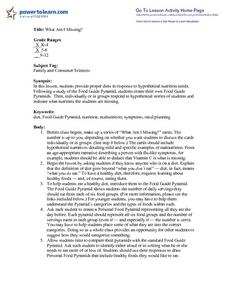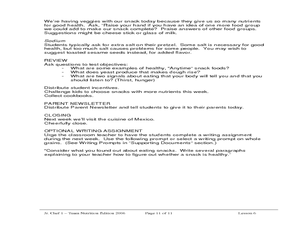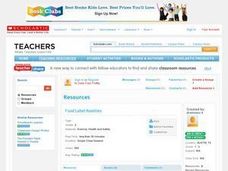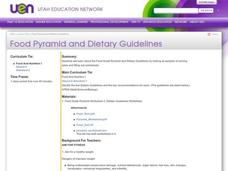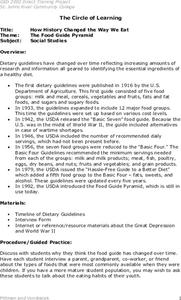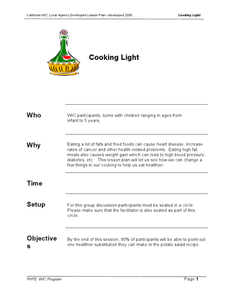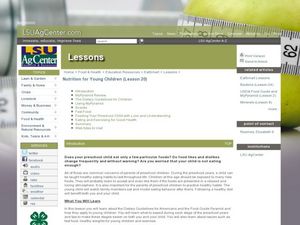Curated OER
What Am I Missing?
Discuss nutrition and identify components of a healthy diet, view a Food Guide Pyramid, and create a Personal Food Pyramid, listing all foods eaten in the past 24 hours. Compare food lists with the standard Food Guide and determine where...
Curated OER
Tastes Great-- Is It Good for You?
Students use the food guide pyramid established by the U.S. Department of Agriculture to evaluate the nutritional value of their favorite foods.
Curated OER
Food Pyramid and Dietary Guidelines
Students examine Food Guide Pyramid and Dietary Guidelines. They look at samples of serving sizes, sort different foods into their correct groups, complete worksheets to discover which types of foods they eat regularly, and discuss...
Curated OER
Fun with the Food Pyramid
Students explore the five food groups and design a graphic organizer to organize the data researched. A one day food diary kept by students assists them in self-monitoring and self-evaluation of their eating habits.
Curated OER
Key Ingredients: America by Food
Students participate in a series of activities to explore the types of food Americans eat, how food choices differ in various parts of the country, and how the availability of various foods has changed over time.
Curated OER
My Pyramid
Tenth graders analyze the new Food Guide Pyramid. In this healthy diet lesson, 10th graders explore the the website with the new food pyramid. Students use magazines to find foods from the food groups and create their own pyramid....
Curated OER
Family Life Cycle - Children's Lab
Students identify the changing nutritional needs across the life cycle. They create and prepare a variety of healthy foods for children that provide adequate nutrients for optimum growth and development. They identify guidelines in...
Curated OER
Jr. Chef Club Super Snacks Lesson 6
Students explore healthy snacks. In this nutrition and cooking lesson, students observe and identify food groups on USDA's MyPyramid food guide. Students discuss how fiber helps our digestive system and follow a recipe using yeast to...
Curated OER
Food Label Realities
Second graders identify nutritional information on food labels. In this nutrition lesson, 2nd graders bring in food labels from home and practice reading them. Students discuss the nutritional content, such as caloric content. Students...
Curated OER
Food Pyramid and Dietary Guidelines
Third graders complete activities and worksheets to explore the Food Guide Pyramid and Dietary Guidelines .
Curated OER
How History Changed the Way We Eat
Students participate in a lesson that is concerned with the history of the food pyramid and how it evolved and changed into its modern state. After being presented with the information they conduct classroom discussions about the research.
Curated OER
Cooking Light
Students study the food pyramid. In this adult health lesson plan, students discover ways to change their cooking habits to lessen fat content. Given different recipes, they brainstorm ways to change some of its fatty ingredients to make...
Curated OER
Family Life Cycle - Children's Lab
Students review how their nutritional needs change over time. In groups, they design their own menu in which they get all the nutrients they need. To end the lesson, they share their foods with the class and complete a wordsearch...
Curated OER
Animals, Soil, Trees
Fourth graders describe the various kinds of soils and how plants and animals are affected by them. They describe the baic needs of plants, scoring at least a 3 or 4 on a 4-point rubic. Students are able to predict and/or infer what...
Curated OER
Learning About My Eating Habits
Learners explore their own dietary habits and identify food pyramid guidelines including serving sizes and recommended portions. They complete worksheets, conduct Internet research and evaluate school lunches.
Curated OER
Nutrition for Young Children
Students examine the dietary guidelines for young children. In this healthy diet lesson students examine the issues surrounding the children's diets.
Curated OER
Description and Modifying: What's On Your Plate?
Young scholars create a food product and an advertisement promoting it. In this description and advertising lesson, students read children's book for inspiration and discover advertising techniques. Young scholars complete their ads...
Curated OER
Cloudy With A Chance of Meatballs
Second graders explore weather. In this weather lesson, 2nd graders read Cloudy With A Chance of Meatballs and participate in four supplemental science activities. Students participate in Internet research, create weather maps,...
Curated OER
Biology: living Things and their Environment
Middle schoolers recognize that organisms depend on other organisms. In this organism lesson, students understand symbiotic relationships and competition. Middle schoolers explain food chains and food webs. Students understand that...
Curated OER
Family Life Cycle
Learners review the food groups and their placement on the food pyramid. Using the internet, they research the nutritional guidelines for different age groups and compare them. To end the lesson, they identify reasons for choosing the...
Curated OER
Human Needs
Pupils investigate human needs and how they have adapted to different environments. They complete an experiment to discover the effect of stress on muscles. They use the food pyramid to create a plan for healthy eating.
Curated OER
Understanding Portion Sizes
Students analyze portion sizes in a healthy diet. In this portion sizes lesson, students complete a food group choices worksheet and identify the correct portion of food. Students work in groups to teach the unit to elementary students....
Curated OER
Boy Scout Merit Badge: Cooking
In this boy scout merit badge: cooking worksheet, 8th graders research the topic using websites listed, answer 8 detailed questions about food safety, the food pyramid, and careers, then plan and prepare several menus, including costs.
Curated OER
Family Life Cycle - Breakfast Lab
High schoolers review the nutritional needs of various age groups. In groups, they plan a breakfast meal for different age groups and spend time making the foods. To end the instructional activity, they serve the food to their...


